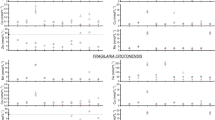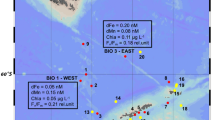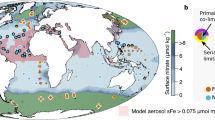Abstract
THE total zinc concentration in unpolluted marine waters has been reported to be in the 10−10 M range1. Such low concentration of an essential micronutrient suggests that the growth of some phytoplankton may be zinc limited. Of the trace metals necessary for phytoplankton growth, only iron has been considered a potential limiting micronutrient in the marine environment2,3. On the basis of laboratory work which focused mostly on copper, it is well known that the toxicity of a trace metal depends on its chemical speciation and can be related uniquely to its free ion activity4,5. However, it has not been established unequivocally that the availability of some metals may also be controlled by their free ion activities and may thus be depressed by organic complexation. Here we report laboratory experiments demonstrating that the zinc ion activity (rather than the total zinc concentration) can limit the growth rate of a coastal diatom Thalassiosira weissflogii (Grun. = T. fluviatalis Hust.) and that the limitation occurs at zinc ion activities which would be present in unpolluted seawater if any organic complexation of zinc were taking place.
This is a preview of subscription content, access via your institution
Access options
Subscribe to this journal
Receive 51 print issues and online access
$199.00 per year
only $3.90 per issue
Buy this article
- Purchase on Springer Link
- Instant access to full article PDF
Prices may be subject to local taxes which are calculated during checkout
Similar content being viewed by others
References
Bruland, K. M., Knauer, G. A. & Martin, J. H. Nature 271, 4749 (1978).
Lewin, J. C. & Chen, C. H. Limnol. Oceanogr. 16, 670–675 (1971).
Menzel, D. W. & Ryther, J. H. Deep-Sea Res. 7, 276–281 (1961).
Anderson, D. M. & Morel, F. M. M. Limnol. Oceanogr. 23, 283–295 (1978).
Sunda, W. & Guillard, R. R. L. J. mar. Res. 34, 511–529 (1976).
Lehninger, A. L. Biochemistry, 2nd edn (Worth, New York, 1975).
Stewart, W. D. P. (ed.) Bot. Monogr. 10, (Univ. of California Press, Berkeley, 1974).
Price, C. A. Biochem. J. 82, 61–66 (1962).
Price, C. A. & Quigley, J. W. Soil Sci. 101, 11–16 (1966).
Wacker, W. E. Biochemistry 1, 859–865 (1962).
Morel, F. M. M. et al. J. Phycol. (submitted).
Westall, J. C., Zachary, J. L. & Morel, F. M. M. MINEQL: A Computer Program for the Calculation of Chemical Equilibrium Composition of Aqueous Systems Tech. Note no. 18 (Ralph M. Parsons Lab. for Water Resources and Envir. Engng, MIT Dept of Civil Engng, 1976).
Guillard, R. R. L. & Lorenzen, C. J. J. Phycol. 8, 318–323 (1972).
Guillard, R. R. L. & Ryther, J. H. Gran. Can. J. Microbiol. 8, 229–239 (1962).
Jensen, A., Rystad, B. & Melsom, S. J. exp. mar. Biol. Ecol. 15, 145–157 (1974).
Author information
Authors and Affiliations
Rights and permissions
About this article
Cite this article
ANDERSON, M., MOREL, F. & GUILLARD, R. Growth limitation of a coastal diatom by low zinc ion activity. Nature 276, 70–71 (1978). https://doi.org/10.1038/276070a0
Received:
Accepted:
Issue Date:
DOI: https://doi.org/10.1038/276070a0
This article is cited by
-
The Role of Natural Organic Ligands in Dissolved Copper (II) Distribution at Tropical Coastal Water
Thalassas: An International Journal of Marine Sciences (2023)
-
The surface reactivity of iron oxide nanoparticles as a potential hazard for aquatic environments: A study on Daphnia magna adults and embryos
Scientific Reports (2018)
-
The impact of atmospheric deposition of cadmium on dominant algal species in the East China Sea
Journal of Ocean University of China (2016)
-
Geochemistry of Altungol cap dolostones from the Tarim Basin, NW China
Arabian Journal of Geosciences (2016)
-
Analysis of Cu, Co, V and Zn in coastal waters of the East China Sea by inductively coupled plasma mass spectrometry (ICP-MS)
Journal of Ocean University of China (2016)
Comments
By submitting a comment you agree to abide by our Terms and Community Guidelines. If you find something abusive or that does not comply with our terms or guidelines please flag it as inappropriate.



